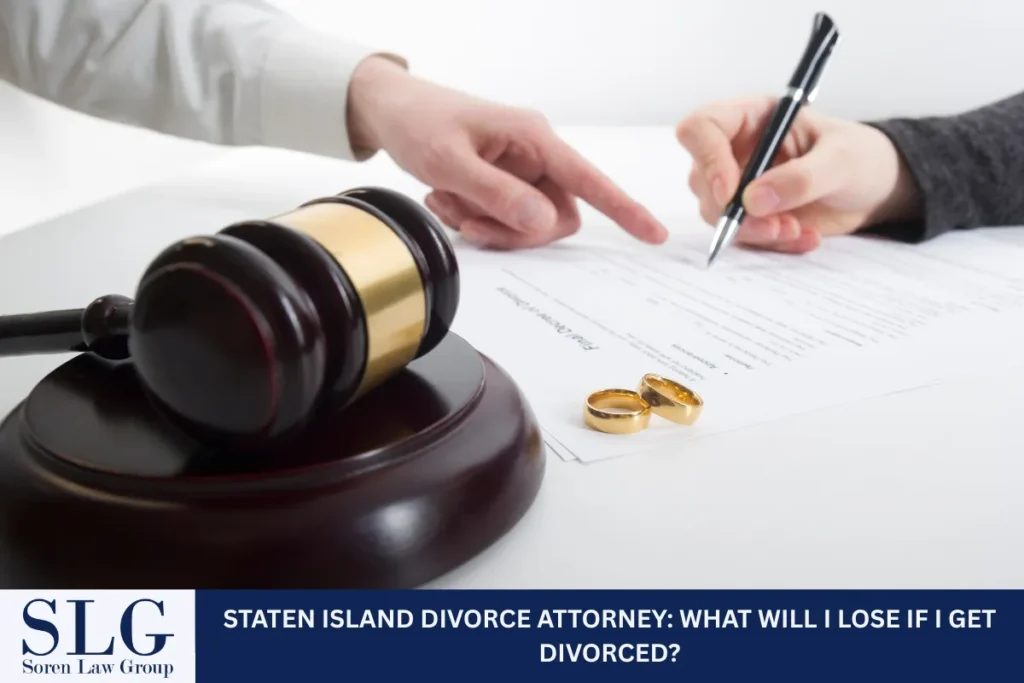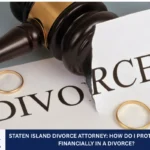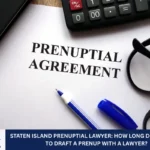If you’re searching for a divorce attorney, you likely have one main question: What will I lose if I get divorced? Facing divorce in Staten Island, New York City, or anywhere else may bring up fears about the fate of your home, finances, and even your future. Divorce can be stressful and confusing, especially when valuable assets, custody battles, or spousal support are on the line. Navigating the divorce process without the right knowledge or experienced legal representation could put your hard-earned savings, investments, or parental rights at risk. But you don’t have to tackle these challenges alone—understanding your rights and New York’s unique laws can help you protect yourself, your property, and your family’s future. In this guide, we’ll reveal what actually happens to your assets, debts, and support arrangements in a New York divorce, and how a skilled divorce lawyer can guide you toward the best possible outcome.
Navigating Divorce in Staten Island: Key Questions and Concerns
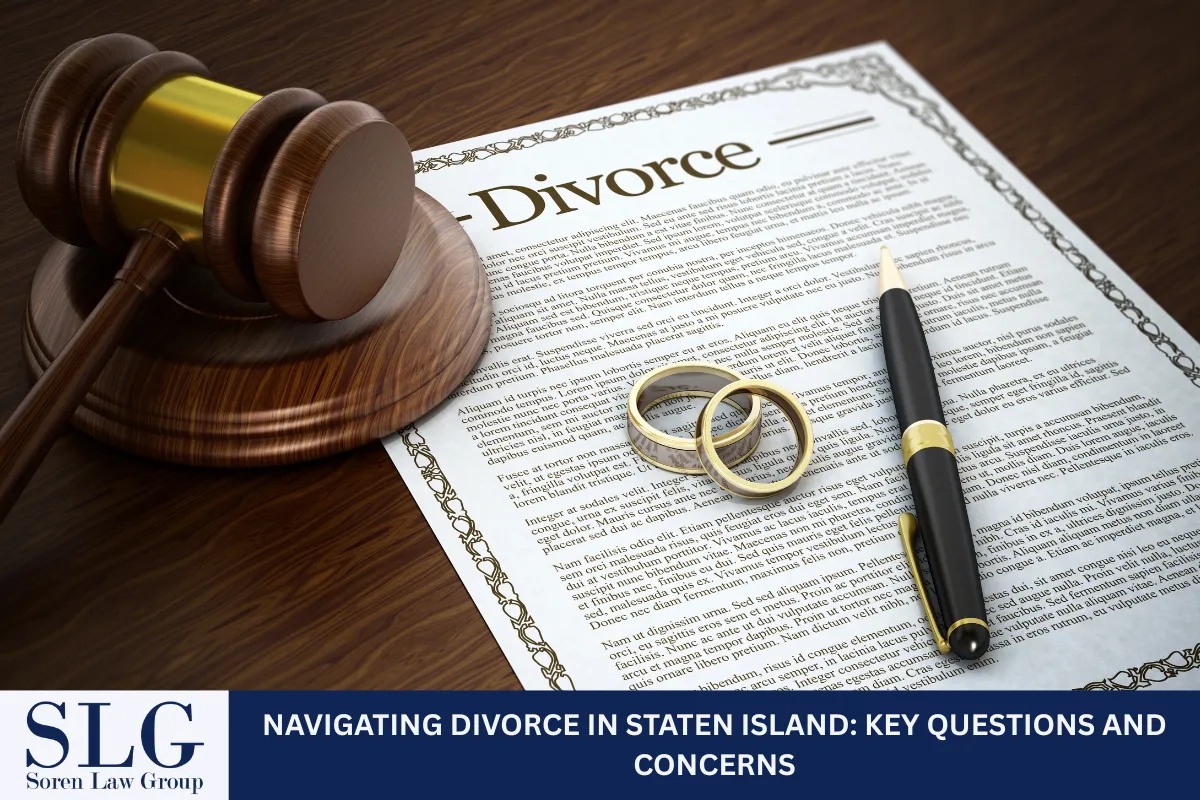
Whether you’re considering filing for divorce or have already started the process, it’s normal to worry about everything from who keeps the marital house to how much you’ll pay in child or spousal support. Some common concerns include:
- Will I lose my savings or retirement accounts?
- How is property divided in New York?
- What happens to business interests or investments?
- Will one spouse be responsible for joint debts?
- How does child custody get decided?
- Can a prenuptial agreement protect my assets?
Addressing these questions starts with understanding how New York law treats property, support, and your rights in a divorce. Let’s break down the most important factors.
What Counts as Marital Property in New York?
In New York, nearly all property acquired during the marriage—no matter whose name is on the account or title—is considered marital property. This concept is at the center of equitable distribution, the rule New York uses to divide property and debt in divorce.
Marital property includes:
- Income earned by either spouse during the marriage
- The marital house or any real estate purchased after getting married
- Retirement accounts (401(k), pensions, IRAs) were added to during the marriage
- Family-owned businesses or business interests established or grown during marriage
- Bank accounts, savings plans, and investment accounts built up together
- Personal property, such as cars, furniture, and jewelry, bought as a couple
Separate property is NOT divided and may include:
- Assets owned before marriage (with some exceptions)
- Inheritances or gifts received individually during the marriage
- Personal injury settlements
- Anything clearly protected by a valid prenuptial or post-nuptial agreement
Important Note: Sometimes assets can get “commingled,” meaning separate resources (like an inheritance) are mixed with marital assets (like a joint savings account). When this happens, tracing and documentation become vital to untangle what’s yours from what’s shared.
How a Divorce Attorney Guides Clients Through Asset Division
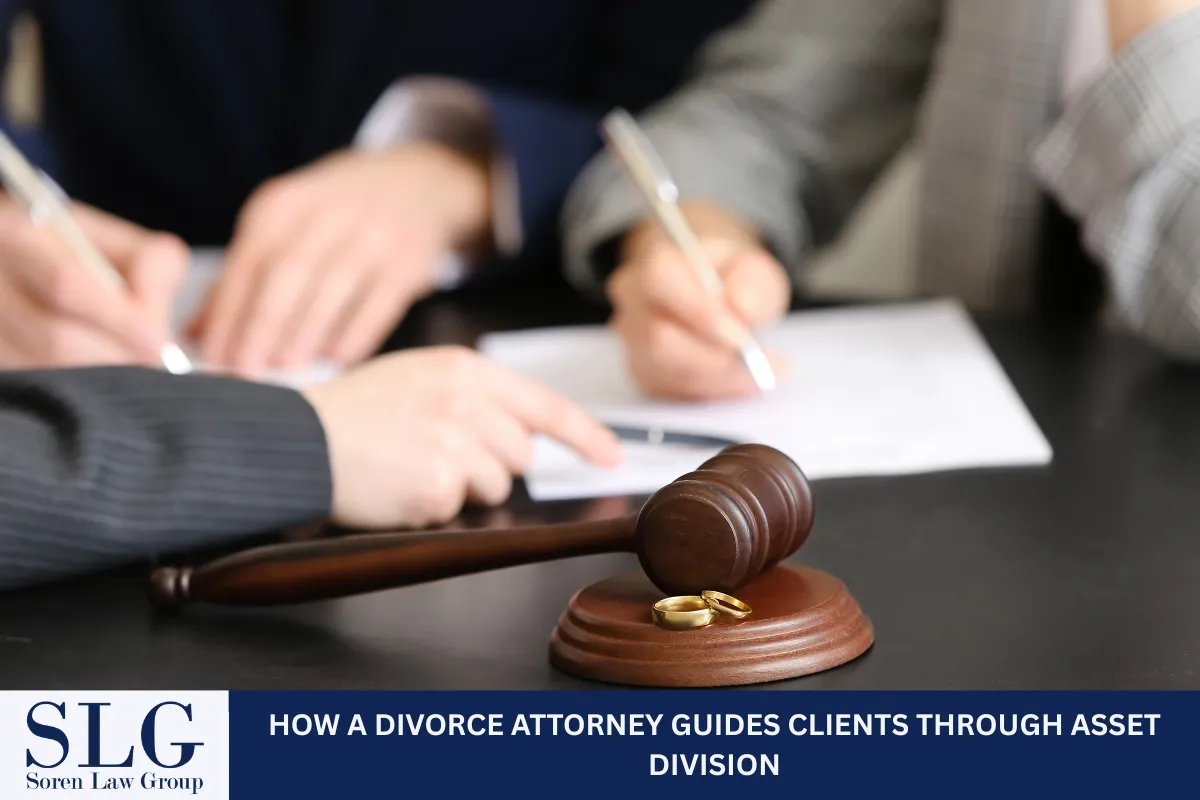
A divorce lawyer in Staten Island or elsewhere in New York will help you:
- Identify and categorize all assets and debts
- Collect documentation (bank statements, pension statements, tax returns, credit reports, business records, etc.)
- Calculate proper asset values (using real estate appraisers or business valuation experts when needed)
- Protect against dissipation (for example, if a spouse is spending or hiding marital funds)
- Advise on separate vs. marital property and reimbursement claims
If your divorce involves high-net-worth assets, business interests, or a complex marital history, experienced legal representation is crucial for accurate asset evaluation and for protecting what’s rightfully yours.
Equitable Distribution: Property Division Is Fair—Not Always Equal
Some people believe that divorce means everything is split 50/50. But under New York’s equitable distribution rules, that’s not always the case. Courts in Staten Island and across NYC strive for fairness, taking into account many factors unique to each marriage.
The judge considers:
- The length of the marriage
- Income and property owned by each spouse at marriage and at the time of divorce
- The age and health of both spouses
- Needs of children involved
- Spousal support or maintenance needs
- Homemaker contributions (not just financial)
- Wasteful dissipation of marital assets by either spouse
- Tax impacts of dividing particular assets
That means one spouse can receive a larger share if fairness calls for it. For instance, a homemaker or someone who sacrificed a career for the marriage may get more to maintain the standard of living experienced during the marriage.
Major Assets at Risk: Home, Retirement, Business Interests, and More

Let’s break down how specific assets are handled in a Staten Island divorce:
Marital House and Real Estate
If the home was purchased during the marriage, it’s almost always marital property—even if only one spouse’s name is on the deed. Courts may order the home sold and the proceeds split. In other cases, one spouse may “buy out” the other’s share, especially if children live there and the court awards exclusive occupancy until they reach adulthood.
Retirement Accounts and Pensions
Retirement benefits (401(k), IRA, pensions) earned during the marriage are divided using a Qualified Domestic Relations Order (QDRO), which legally allows division without tax penalties. Only the portion accrued during marriage is divided; the rest remains separate.
Business Interests
Family-owned businesses, professional practices, or closely held companies require careful business valuation. A divorce lawyer may bring in business appraisers or forensic accountants to determine the fair market value—and ensure hidden assets or income streams aren’t missed. If you have stock options or RSUs, they may also be divided based on when they were earned.
Bank Accounts and Financial Assets
Joint bank accounts and investment accounts are usually split, but if one spouse contributed separate property, that portion may be reimbursed. Maintaining transparency in financial disclosure is essential, and the court may use discovery tools and subpoenas if either spouse attempts to hide assets.
Dealing With Marital Debts and Liabilities
Just as with assets, debts incurred during the marriage (credit cards, loans, mortgages, tax liens) are typically split fairly. However, the court considers which spouse is responsible for the debt and for what purpose the debt was incurred. Sometimes, one spouse could be responsible for debts if they were used recklessly or for non-marital purposes.
Alimony, Spousal Support, and Maintenance in New York
In New York, “spousal maintenance” (sometimes called alimony or spousal support) is paid so that both spouses can come out of the divorce in a more balanced place financially—at least for a period of time.
Factors affecting spousal maintenance include:
- The length of the marriage
- Each spouse’s income and earning potential
- The receiving spouse’s ability to be self-supporting
- Contributions as a homemaker or parent
- The standard of living during marriage
- The age and health of both spouses
- Child custody arrangements
Temporary (pendente lite) maintenance may be awarded while the divorce is ongoing, and final maintenance can last for a set number of years based on the length of the marriage. It is rarely permanent.
Child Support and Custody Battles
New York uses the Child Support Standards Act (CSSA) to calculate child support payments. The law sets percentages of combined parental income to ensure children are provided for, covering basic needs, education, and healthcare.
Child custody in Staten Island and NYC is about the child’s best interests. Joint custody is common, but in contested divorce cases, courts weigh several factors:
- Each parent’s ability to provide a stable home
- The child’s relationship with each parent
- The physical and mental health of both parents
- The child’s wishes (depending on age)
- Any history of domestic violence or an Order of Protection
Parenting time (visitation) is addressed in a Settlement Agreement or Court Order.
How Prenuptial and Post-Nuptial Agreements Affect Divorce Outcomes
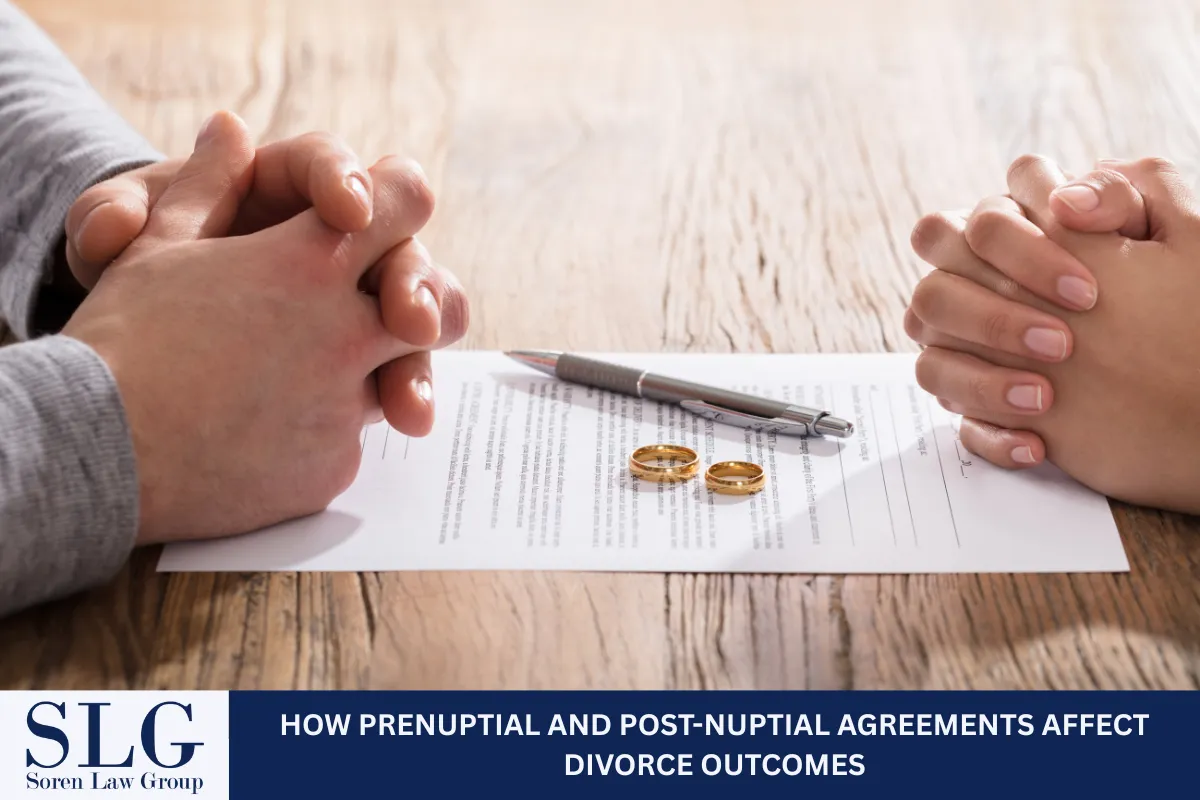
A valid prenuptial agreement or post-nuptial agreement in New York can override many default property division rules. These agreements can specify:
- What remains separate property
- How to divide family-owned businesses
- Spousal maintenance amounts and duration
- Protections for inheritance or business interests
However, courts can invalidate these agreements if they’re found to be unfair, signed under duress, or based on incomplete financial disclosure.
High Net Worth and Complex Divorce Situations
High-net-worth individuals and couples in Staten Island, Manhattan, Brooklyn, Queens, Bronx, Long Island, Suffolk County, and Nassau County face extra risks—more assets mean more to lose. Division may include:
- Multiple real estate holdings
- Investment accounts and complex portfolios
- Business interests or partnerships
- Art, collectibles, or luxury items
- Offshore accounts
This is where discovery, asset valuation, and forensic accounting become critical—especially for tracking down hidden assets, separating joint accounts, and tracing commingled funds.
Special Considerations: Gray Divorce and Financial Planning
Gray divorce refers to couples divorcing later in life, often after decades of marriage. Key concerns include:
- Dividing retirement benefits and pension statements
- Healthcare coverage, especially if one spouse was reliant on the other’s insurance (COBRA may provide temporary post-divorce coverage)
- Estate planning: updating beneficiaries and wills
- Long-term financial adjustments and support
Older couples must plan for their future needs and adjust their retirement plans.
Steps to Protect Your Finances and Assets Before and During Divorce

Preparing for divorce is as much about planning as it is about paperwork. Here’s what you can do to safeguard your interests:
- Gather Documentation: Secure copies of bank statements, tax returns, investment and pension statements, real estate deeds, and loan documents.
- Run Your Credit Report: Know what debts are in your name and monitor for unusual transactions.
- Budget for Legal & Living Costs: Make a financial plan for the months ahead, including possible temporary support.
- Update Passwords and Account Security: Change login credentials for sensitive accounts and enable two-factor authentication.
- Freeze or Limit Joint Accounts: Avoid joint spending sprees. If you suspect wasteful dissipation, alert your legal team.
- Inventory Valuables: Document high-value items with photos or appraisals.
- Consult a Financial Adviser or CDFA: Experts like Certified Divorce Financial Analysts help you forecast financial adjustments.
- Limit Social Media Sharing: Don’t post about finances, purchases, or your divorce process.
How Mediation, Negotiation, and Litigation Shape the Outcome
Not every divorce needs to be a courtroom battle. There are several ways to resolve issues:
- Mediation: Both parties work with a neutral third-party to reach a voluntary Settlement Agreement.
- Negotiation: Lawyers for each spouse negotiate directly, often leading to a compromise that saves time and money.
- Litigation: Disputes are settled by a judge in the New York Supreme Court, especially if there are child custody or complex asset issues.
Uncontested divorces (when parties agree on key terms) are faster and less costly. Contested divorces can take longer, require more documentation, and result in higher attorneys’ fees and litigation costs.
Post-Divorce: Tax, Insurance, and Financial Impacts
After the court issues a Dissolution of Marriage, there are several key steps:
- Tax Returns: Your tax filing status changes. Asset and spousal support transfers may affect taxes; consult a CPA.
- Health Insurance: You might lose coverage on your spouse’s plan. COBRA can provide temporary coverage, but at a cost.
- Update Beneficiaries: Change life insurance, retirement plans, and estate documents to avoid unintended consequences.
- Retirement and Savings Adjustments: Reevaluate your budget, savings plans, and future contributions according to your new circumstances.
Staten Island Divorce Attorney – Soren Law Group

Worried about what you might lose in a divorce? At Soren Law Group, our Staten Island divorce attorneys provide clear, strategic guidance to protect your home, finances, assets, and parental rights. New York’s divorce laws are complex, but our experienced legal team knows how to navigate even the toughest property division, custody, and support issues. Whether you face contested negotiations or high-asset challenges, we fight for the best possible outcome—so you can move forward with confidence.
Call us today at (718) 815-4500 to schedule a consultation and safeguard your interests during divorce.
FAQs: Staten Island Divorce Losses and Protection Strategies
1. Will I lose ownership of my marital house in a Staten Island divorce?
Possibly. If the house was purchased during your marriage, it’s considered marital property under New York law, regardless of whose name is on the deed. The court will assess several factors—such as who has custody of the children, each spouse’s financial needs, and the potential for one spouse to buy out the other. Often, the home is sold, and the proceeds are split. However, in some cases, a spouse with primary child custody may be granted exclusive use of the marital house for a period. Remember, each case is different, so a skilled divorce attorney can help negotiate or argue for a solution that fits your family’s situation.
2. How are retirement accounts and pensions handled in a Staten Island divorce?
Retirement accounts and pensions accumulated during marriage are split equitably, not necessarily equally. Using a Qualified Domestic Relations Order (QDRO), the portion earned during the marriage can be transferred to your ex-spouse’s account without triggering tax penalties or early withdrawal fees. Pre-marital balances remain separate. It’s important to have proper documentation—such as pension statements and plan balances at marriage and divorce dates—to ensure accuracy. Consulting a financial expert or CDFA can help you understand the division and future value of your retirement benefits.
3. If I own a business, am I at risk of losing a share in a divorce?
Yes, business interests formed or grown during the marriage are treated as marital assets and may be subject to valuation and division. The court considers factors such as your spouse’s contributions (including non-financial contributions), your roles in the business, and the business’s increase in value. Often, experts like forensic accountants or business valuation professionals determine fair market value. You might negotiate to “buy out” your spouse’s interest, trade assets, or arrange structured payments. Pre-and post-nuptial agreements help protect business ownership rights, but only if properly drafted and fully disclosed.
4. What steps can I take to prevent my spouse from depleting our accounts before or during divorce?
Act quickly by documenting all accounts with up-to-date bank statements, freezing or limiting transactions on joint accounts with your bank’s assistance, and informing your attorney if you suspect dissipation or unauthorized withdrawals. New York’s Automatic Orders (issued when a divorce is filed) legally prohibit either spouse from transferring or encumbering property without court permission. If you believe there’s a risk, your attorney may file an Order to Show Cause for specific protection orders. Transparent financial disclosure and swift action are your best defense.
5. Can my prenuptial agreement be challenged by my spouse?
Prenuptial agreements are generally enforceable in New York as long as both spouses fully disclose their financial assets and voluntarily enter the agreement. However, your spouse could challenge its validity if they claim they signed under duress, there was fraud, or the terms were unconscionably unfair at the time of signing or enforcement. Courts will review whether each party had access to independent legal counsel and a full understanding of the terms. Keeping clear documentation and ensuring procedural fairness at the time of signing is essential for enforceability.
Read more: Staten Island Divorce Attorney: What Does Conflicted Out Mean in a Divorce Case?

